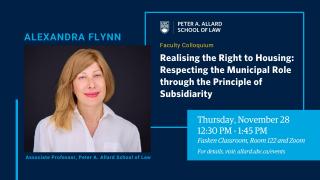Event Description
Canada is experiencing a dire housing crisis, decades in the making, which disproportionately impacts middle- and lower-income people. Without adequate affordable housing, the most vulnerable people end up precariously housed, moving between public and private spaces without security of tenure. A significant challenge in addressing this ‘wicked problem’ is that multiple jurisdictions – federal, provincial, municipal – must come together to create sufficient housing stock and ensure affordability. In Canada, the federal government has historically provided funding for housing infrastructure; provinces have introduced legislative measures like residential tenancy protections; and municipalities regulate land-use and provide temporary shelter spaces. In reality, however, measures may be overlapping and should involve coordination amongst all three governments, resulting in a lack of clear accountability. This presentation explores an unintended casualty in this fractured model: the undermining of municipal attempts to address gaps in housing regulation. I outline the issue with a focus on the City of Vancouver, arguing in favour of an expanded application of the principle of subsidiarity by the courts.
Speaker
- Allard School of Law
- Research
- All Students
- Faculty
- Graduate Students
- JD
- Staff
- Research Talks

